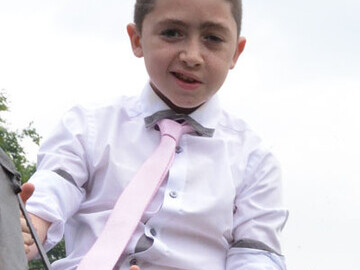ROUTINE PHYSIOTHERAPY RARELY A REALITY FOR FACIAL PALSY PATIENTS
Other children told him he had a wonky face and didn't smile properly, and it's had a big effect on him.
97% of the general public believe that treatments for facial palsy should be routinely available via the NHS, a recent survey by charity Facial Palsy UK suggests. Yet many patients struggle to access the help they need.
The survey conducted in collaboration with Research Now, also found that 60% of the general public expected that physiotherapy would be offered to those with facial palsy, showing a marked contrast to the reality for this patient group, many of whom struggle to access specialist physiotherapy due to lack of specialist services, research and funding.
Professor Jonathan Cole, consultant in clinical neurophysiology, says; “Physiotherapy is often about more than facial therapy; it allows the patient time with a professional to explain and support. Physiotherapists play an important role in boosting self-esteem and providing education to patients about the condition."
Facial palsy, which affects over 100,000 people in the UK, occurs when the facial nerve is absent or damaged and can affect the ability to close the eye, smile, speak, eat and drink. There are more than 30 different causes of facial palsy with Bell's palsy being the most common, affecting between 12,400 and 24,800 people per year. A third of patients diagnosed with Bell's palsy are left with permanent disability. You can also be born with facial palsy or acquire it as a result of trauma, surgery, neurological conditions and more.
Michelle Budgen, whose son Tyler was diagnosed with Bell's palsy at 5 years old, says “Tyler is now 10 and still desperate to get his smile back. He was bullied a lot, other children told him he had a wonky face and didn't smile properly, and it's had a big effect on him. We were lucky to be referred to a specialist facial palsy clinic a year after he was first diagnosed but it's quite a distance from where we live so we can only get there once a year. Tyler is really good about doing the exercises he was given but he does end up doing his own thing and it's difficult for the clinic to monitor him remotely."
Kay Turner, from Lancashire, says: “I've had Bell's palsy twice, on different sides of my face. My face often feels bruised under the skin, making it painful and uncomfortable. I also struggle to eat, I have to choose very soft food and eat slowly. I rarely eat out in public anymore. I know from reading the stories of others with Bell's palsy that physiotherapy could really help me, but because there is not enough research into the benefits I can't access this help via the NHS."
Karen Johnson, Deputy CEO of Facial Palsy UK, says: “We're urgently trying to raise awareness of the needs of this patient group. There's no nationally funded research being done into the condition. We have helped develop a prototype for an iPad app which will make it easier to monitor physiotherapy outcomes for facial palsy. One of the major benefits of the App for patients like Tyler is that we can integrate a gaming aspect making it fun for him to do his exercises. People will also be able to change their faces into different characters or animals so they can disassociate the exercises from bad memories of bullying. Many people with facial palsy want to take some control over their own recovery and physiotherapy helps not only functionally but psychologically too."
Facial Palsy Awareness Week takes place from 1-7 March 2016. For more information visit www.facialpalsy.org.uk/awareness
ENDS
About Facial Palsy UK (www.facialpalsy.org.uk), charity established 2012.
Facial Palsy Awareness Week - http://www.facialpalsy.org.uk/awareness
Charity Aims
- To increase awareness of facial palsy and its social, physical and psychological consequences.
- To provide information and support for people living with facial palsy, their relatives, carers and medical professionals.
- To promote diagnosis, acute and long-term management and rehabilitation of people living with facial palsy.
- To establish support groups throughout the UK.
- To raise funds to support research and training for professionals involved in the diagnosis, management and treatment of facial palsy. This should allow for better treatments, which should be made accessible to all.
For a range of case studies, photos and more information contact:
Karen Johnson, Facial Palsy UK, Eventus, Sunderland Road, Market Deeping, Peterborough, PE6 8FD
Tel: 0300 030 9333
Email: media@facialpalsy.org.uk
About Research Now
Research Now Group, Inc., is the global leader in digital data collection to power analytics and insights. It enables data-driven decision making for its 3,000 market research, consulting, media, and corporate clients through its permission-based access to millions of deeply-profiled consumers using online, mobile, social media and behavioural data collection technology platforms. The company operates in 35 countries, from 23 offices around the globe, and is recognized as the quality, scale and customer satisfaction leader in its industry. For more information go to researchnow.com.
Press release distributed by Pressat on behalf of Facial Palsy UK, on Tuesday 1 March, 2016. For more information subscribe and follow https://pressat.co.uk/
Facial Palsy Awareness Week Facial Paralysis Physiotherapy Charities & non-profits Health
You just read:
ROUTINE PHYSIOTHERAPY RARELY A REALITY FOR FACIAL PALSY PATIENTS
News from this source:





